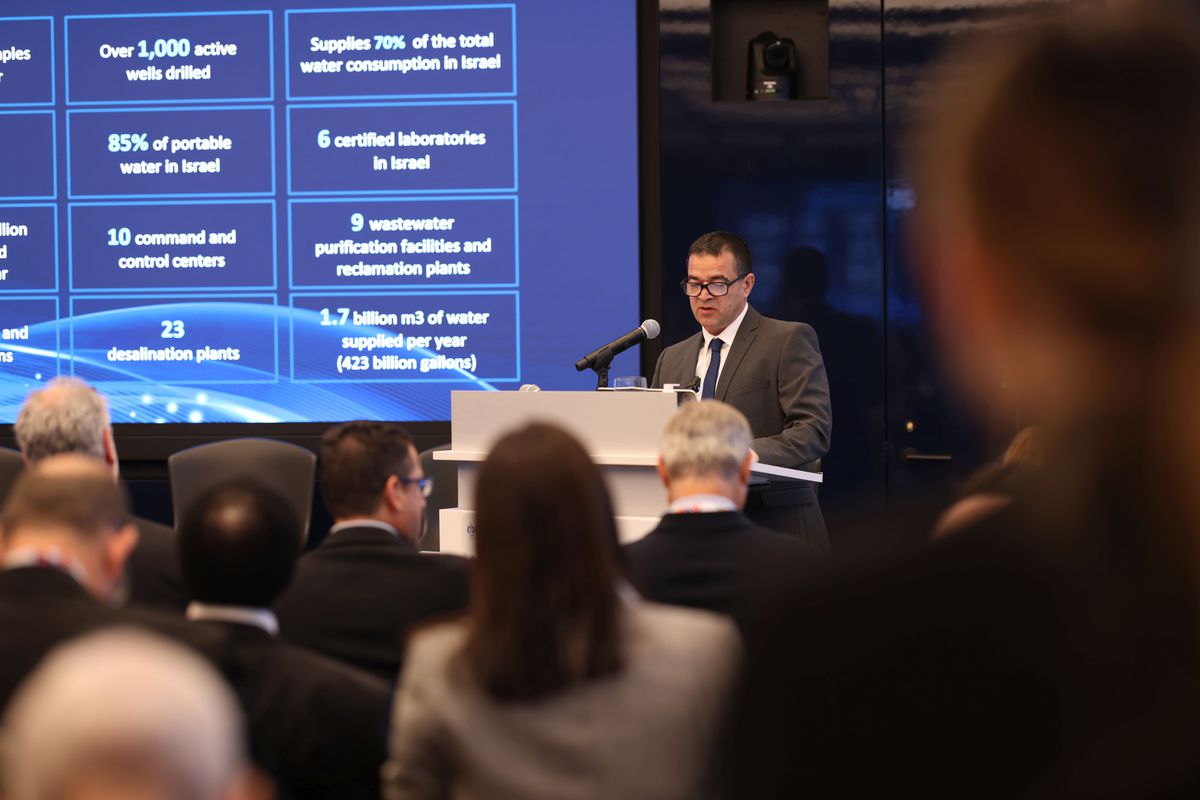Amit Lang: Innovating to ensure long-term water security in Israel
In a world grappling with the effects of climate change, Israel's national water utility, Mekorot, emerges as a trailblazer in securing a sustainable water future. CEO Amit Lang, shares insights into the utility's pioneering efforts, the role of digitalization and its success in driving innovation in the water sector.
Ensuring sufficient water supply
As the leader of Israel's national water utility, Amit Lang is confident in the country’s readiness to tackle the impacts of climate change in day-to-day operations and the provision of high-quality water services.
Israel has taken proactive measures to ensure a sufficient water supply and there are no anticipated water shortages in the country in the coming decade. Investments in desalination plants, both completed and in progress, will contribute to a surplus of water, even during drought years, he says.
"Israel has invested in new desalination plants, all private owned, with one set to be completed by the end of this year and another in progress, which will contribute a surplus of water even in drought years," the CEO proudly reveals.
We have invested in new desalination plants, with one set to be completed by the end of this year and another in progress, which will contribute a surplus of water even in drought years.
"To maintain our functioning utility, we continually develop our systems with an annual investment of around half a billion dollars. This allows us to accommodate the increasing amount of desalinated water and improve efficiency while minimizing costs, both financially and environmentally."
Israel’s desalination strategy
Desalination plays a crucial role in Israel's water security strategy. A new desalination plant in Salt Lake, for example, will be the most efficient in Israel, helping to significantly reduce costs compared to previous plants. By producing its own energy efficiently, the plant will have a lower carbon footprint. It will also help to cut the cost of desalinated water substantially.
"Regarding desalination plants, it is true that energy consumption has traditionally been a significant factor. However, advancements in technology have led to improved efficiency," he explains.
“The cost of desalinated water has also seen a substantial decrease, from approximately 60-euro cents per cubic meter to around 35 euro cents."
Israel began desalinating water five decades ago and today, around 70 per cent of its potable water comes from desalination plants.
Recycled water as a resource
While desalination is a cornerstone of Israel's water security strategy, water reuse also plays a significant part. With advanced facilities, the quality of recycled water is approaching that of potable water, and nowadays being considered as a new resource for the water sector, along with desalinated water. Currently, about 85 per cent of the water in Israel is reused, reducing the reliance on desalinated water, especially in agriculture.
"Water reuse is an integral part of our strategy," the CEO emphasizes. "By properly recycling and reusing water, we can reduce the demand for desalinated water, particularly in agriculture where water reuse can substitute for potable water. In fact, we have advanced facilities where the quality of recycled water is approaching that of potable water,” he adds.

Israel's water sector has witnessed remarkable success in using water for agricultural purposes. The country has built a strong economy with water as its backbone, significantly boosting the agricultural sector. Advanced practices have optimized water usage, making Israel standout in terms of water security, supply, and economic development.
"We manage three different sources of water in our system: groundwater, aquifer water, and desalinated water, with desalination accounting for nearly 70 per cent of our supply. Despite the high percentage of desalinated water, our tariffs remain competitive, which demonstrates the success of our operations,” adds the CEO.
Managing non-revenue water loss
The success of Israel's water sector is attributed to a combination of factors, including infrastructure quality, technology and maintenance practices, he adds. One of the key elements is record low non-revenue water (NRW) – lost through leaks, theft and unaccountable water.
"Mekorot is highly efficient, with less than four per cent non-revenue water loss, significantly lower than the global average," the CEO shares.
To maintain our functioning utility, we continually develop our system with an annual investment of around half a billion dollars.
The average global NRW rate stands at around 30 per cent. Mekorot attributes its low NWR loss primarily due to the quality of infrastructure, with investments in materials, alignments, and construction techniques to ensure durability and minimize leakage. Advanced technology allows for efficient command and control of the system, identifying pipelines that need replacement and regulating pressure to prevent leaks.
“Even our oldest pipelines from the original national carrier are still functional after decades of use. Our goal is to have a reliable and efficient system that minimizes water loss,” says Lang proudly.
Investing in start-ups
The CEO also sees the role of water utilities as helping to accelerate water innovation. Mekorot actively invests in start-ups to drive technological advancements in the water sector. By partnering with eight start-ups and providing financial support to them, it’s win-win: the utility not only benefits from their solutions but also helps these young ventures validate their products and scale their operations.
"Despite being a traditional and conservative industry, there is a significant place for innovation in the water sector," the CEO emphasizes. "We’ve made great strides in this area and are perhaps the only governmental company that actively invests in start-ups.”
Mekorot’s focus on digitalization and the use of AI is reshaping the water utility industry in Israel and beyond. The utility says it is fully invested in digital twin technology, aiming to make all operations accessible through smartphones. By harnessing AI capabilities, it is able to improve maintenance planning, detect abnormalities in the system, and address malfunctions more efficiently.
"We are fully invested in digitalization as we believe it can bring significant positive changes to our operations," the CEO affirms. "Collaborating with major tech companies like Microsoft, IBM, and Google, we strive to remain at the forefront of technology and be recognized as the best company in our industry."
Sustainability initiatives
Discussing reducing water demand, Lang says that success here comes from historically pricing water right. By establishing the right pricing structure and launching awareness campaigns, the CEO says that Mekorot encourages responsible water usage and conservation.
"About 10 years ago, we addressed the challenge of reducing water demand through a combination of 40 per cent increased pricing and awareness campaigns," the CEO shares.
"Even though we no longer face water scarcity issues, people in Israel continue to value water and actively strive to conserve it. The acceptance of the current pricing structure is widespread, and the importance of responsible water usage is ingrained in our society."
Israel’s national water utility stands as a beacon of success in water management. Its investment in desalination plants, technological advancements, commitment to sustainability, and innovative partnerships help to ensure water security for the future.
Share your water technology stories with us
Do you have an innovation, research results or an other interesting topic you would like to share with the international water technology industry? The Aquatech website and social media channels are a great platform to showcase your stories!
Please contact our Sr Brand Marketing Manager Annelie Koomen.
Are you an Aquatech exhibitor?
Make sure you add your latest press releases to your Company Profile in the Exhibitor Portal for free exposure.
We promise never to send you spam and you can unsubscribe at any time!
